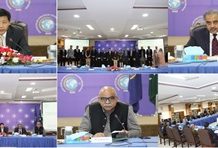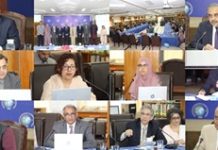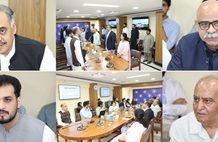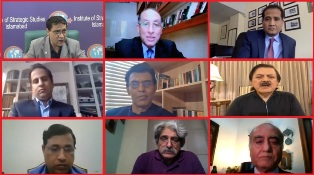Press Release
Providing Debt Relief: Time for Solidarity
June 1, 2020
The Institute of Strategic Studies Islamabad (ISSI) organized a webinar today titled “Providing Debt Relief: Time for Solidarity,” to discuss Prime Minister Imran Khan’s Global Initiative on Debt Relief, the current economic situation emerging out of the pandemic and to dwell on possible solutions.
Dr. Salman Shah, Advisor on economic affairs and planning to Chief Minister, Punjab, was the Keynote Speaker at the occasion. The webinar comprised an eminent panel of speakers including: Mr. Farrukh Iqbal Khan, Director General (UN), Ministry of Foreign Affairs; Dr. Usman Chohan, Director, Economic Affairs & National Development, Centre for Areospace & Security Studies; Dr. Abid Qaiyum Suleri, Executive Director, Sustainable Development Policy Institute, Islamabad, Mr. Humayun Akhtar Khan, Chairman & CEO, Board of Institute for Policy Reforms, Lahore; and Dr. Muhammad Iftikhar ul Husnain, HoD Economics, COMSATS University, Islamabad.
The discussion was moderated by Director Research, ISSI, Mr. Najam Rafique, who highlighted that in a battle to overcome the pandemic, the developing world has to contend with current account and fiscal deficits, faltering service and production industries, failing businesses, and laboring national budgets. With falling exports and remittances, balancing their budget will be an uphill task for many developing countries. Under these circumstances, it is important that there be a unified global effort to implement Prime Minister Imran Khan’s Global Initiative on Debt Relief.
In his introductory remarks, Director General ISSI, Ambassador Aizaz Ahmad Chaudhry stated that debt overload is a global phenomenon and the developing countries are gravely affected by this more than others. He said that the present state of the world may be heading towards a depression, similar to that of the 1920’s, and therefore, it is time for solidarity and that all stakeholders must come together to defeat this challenge and reach common solutions. He pointed out that GDP is shrinking, exports are going down and we are heading towards a very challenging situation.
Dr. Usman Chohan stated that COVID-19 is a health and economic crises, which has pushed many financial entities and households to the edge as factories are ceasing production, retail stores and restaurants are closing, commodity prices have nosedived and unemployment has become rampant. He also said that the scope of things is far worse than it was in 2008-09 and the developing countries have become more indebted as a consequence. Similarly, the government debt has also doubled in Pakistan.
Mr. Farrukh Iqbal Khan articulated that Prime Minister Imran Khan has called for global debt relief and is continuously engaging with the world community in this regard. He said that sustainability is the need of the hour in order to move ahead. He was of the opinion that it would be best to pursue debt suspension rather than debt relief since it would not be possible for the international financial institutions to completely write off debts.
Sharing his observations on the subject, Dr. Abid Qaiyum Suleri stated that the pandemic which is going to lead to negative GDP growth is likely to affect Pakistan’s economy in dire ways and the recent locust attacks are also very likely to further exacerbate the situation. The ongoing pandemic is posing grave challenges for Pakistan and the lockdown has shut many businesses and affected the informal economy as well. The closure of economic activity poses several challenges, especially in the shape of growing unemployment.
Mr. Humayun Akhtar Khan, while giving his perspective stated that Prime Minister Imran Khan has been the first one to call out for debt relief. He said that the dilemma is that addressing health crises weakens the economy as saving lives requires a strict lockdown. The economy was already in a slowdown and when this pandemic emerged, the government was already struggling to bring about some economic stability via IMF programs. He further said that the country has long been facing an endemic problem of public debt and it has further worsened with the COVID-19, along with a fall in GDP as estimated by the government.
Dr. Iftikhar Husnain shared his views regarding the current economic challenges in the context of debt relief. He emphasized on the need for long-term solutions to the current problems as the pandemic is likely to continue and that the challenging question of the tradeoff between saving lives or the economy continues to be a serious challenge leading to socio-economic problems.
Dr. Salman Shah, in his keynote address drew attention to the fact that the pandemic has created an extraordinary situation never witnessed before. He said that unfortunately, this is a global economic meltdown and all services are affected by it in severity. Moreover, he said that the government has to focus on economic development and on creating employment generation along with the required social security nets.
In his concluding remarks, Ambassador Khalid Mahmood, Chairman Board of Governors, ISSI said that we need to do more regarding economic diplomacy and mobilize public support for this cause. He opined that the government needs to work on putting together a sustainable growth model.













